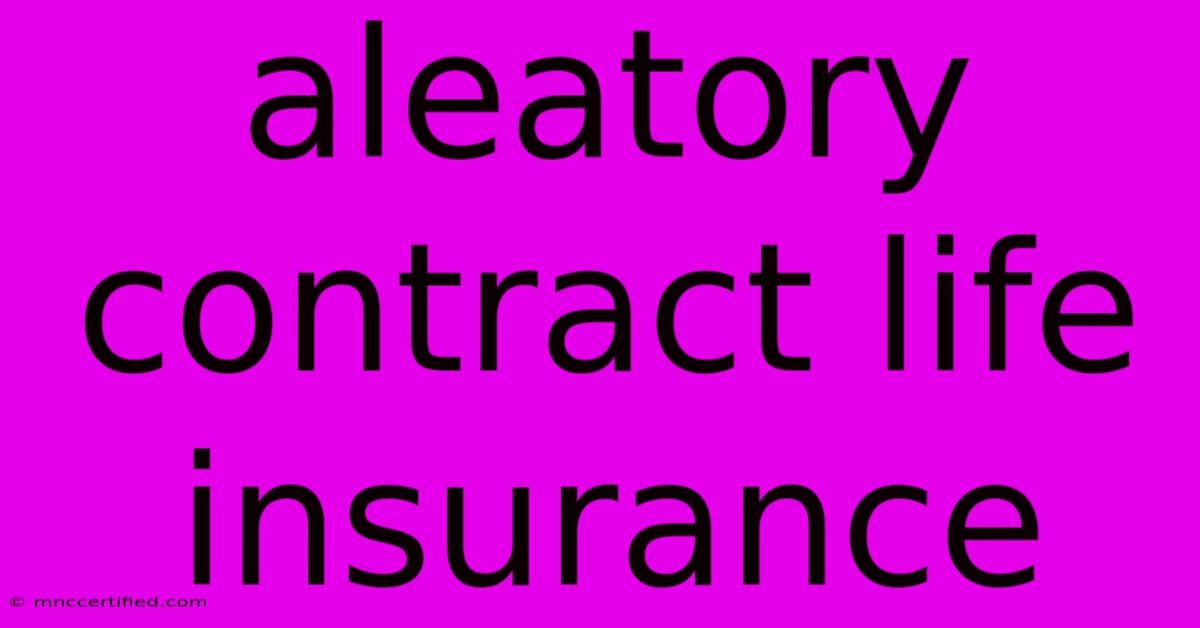Aleatory Contract Life Insurance

Table of Contents
Understanding Aleatory Contracts in Life Insurance
Life insurance policies are fundamentally aleatory contracts. This means that the exchange of values between the parties involved – the insurer and the insured – isn't equal. One party, the insurer, might receive significantly more than the other, depending on the outcome. Understanding this core principle is crucial for anyone considering life insurance. This article will delve into the specifics of aleatory contracts in life insurance, explaining what they are, how they work, and their implications for both insurers and policyholders.
What is an Aleatory Contract?
An aleatory contract is a type of agreement where the performance of one or both parties is contingent upon the occurrence of an uncertain event. The outcome is uncertain at the time the contract is made, meaning the value exchanged by each party is disproportionate. This is distinctly different from a commutative contract, where the values exchanged are roughly equal at the outset.
Think of it this way: You pay relatively small premiums over a long period (potentially decades). The insurer, in return, promises a potentially large payout only if a specific event (your death) occurs. If you die within the policy term, your beneficiaries receive a substantial sum. If you live past the policy term, the insurer retains your premiums and only pays out the policy's cash value, if applicable. This disparity in potential outcomes is the defining characteristic of an aleatory contract.
Aleatory Contracts and Life Insurance: A Closer Look
The aleatory nature of life insurance is perfectly illustrated in its core function: providing financial protection against the risk of premature death. You pay premiums hoping you won't need the benefit. The insurance company hopes you live a long life so they can profit from your continuous premium payments. However, this isn't viewed as unfair. The insurer is accepting the risk of significant financial loss in exchange for your ongoing payments.
Key characteristics of aleatory contracts in life insurance:
- Uncertainty of Outcome: The biggest uncertainty lies in when (or if) the death benefit will be paid out. This is entirely dependent on the insured's lifespan.
- Unequal Exchange of Value: The premiums paid are typically far less than the potential death benefit. This imbalance is acceptable because it reflects the inherent risk the insurer undertakes.
- Risk Allocation: The policyholder transfers the risk of financial hardship due to premature death to the insurer. In return, the policyholder pays a premium to mitigate that risk.
- Conditional Performance: The insurer only performs its obligations (paying the death benefit) upon the occurrence of a specific event – the death of the insured.
Types of Life Insurance Policies & Aleatory Contracts
The aleatory nature of the contract applies across various life insurance policies, including:
- Term Life Insurance: This provides coverage for a specified period. It's the purest example of an aleatory contract, as the insurer only pays out if death occurs within the term.
- Whole Life Insurance: Provides lifelong coverage, and offers a cash value component that grows over time. While the cash value adds another layer of complexity, the fundamental aleatory aspect remains, as the primary payout is still contingent upon death.
- Universal Life Insurance: Similar to whole life, but with more flexibility in premium payments and death benefit adjustments. The inherent risk and unequal exchange of value persist.
Legal Implications and Consumer Protection
Because life insurance is an aleatory contract, it's essential to understand the terms and conditions thoroughly before purchasing a policy. The principle of utmost good faith (uberrimae fidei) applies, meaning both the insurer and the insured must disclose all material facts relevant to the policy. Failure to do so could lead to contract voidance.
SEO Keywords for this Article:
- Aleatory contract
- Life insurance
- Insurance contract
- Aleatory contract definition
- Life insurance policy
- Term life insurance
- Whole life insurance
- Universal life insurance
- Insurance risk
- Utmost good faith
- Uberrimae fidei
- Death benefit
- Premiums
- Risk allocation
- Commutative contract
This article provides a comprehensive overview of aleatory contracts within the context of life insurance. By understanding the fundamental principles, consumers can make informed decisions and navigate the complexities of life insurance more effectively. Remember to consult with a qualified insurance professional for personalized advice.

Thank you for visiting our website wich cover about Aleatory Contract Life Insurance. We hope the information provided has been useful to you. Feel free to contact us if you have any questions or need further assistance. See you next time and dont miss to bookmark.
Featured Posts
-
Mc Bryde Pays Tribute To Late Kris Kristofferson
Nov 21, 2024
-
Pud Master Insurance Certificate
Nov 21, 2024
-
Superior Insurance Wilmington Nc
Nov 21, 2024
-
Northeast Eye Insurance Accepted
Nov 21, 2024
-
Kd Tp Swap Delicious Crypto News
Nov 21, 2024